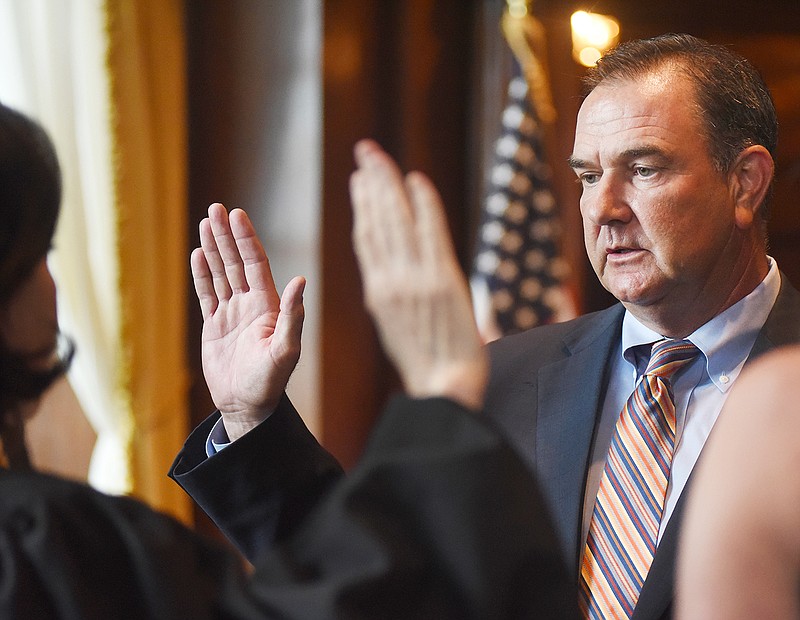Missouri's governor has the constitutional power to fill a vacancy in the lieutenant governor's office, Missouri's Supreme Court ruled Tuesday.
"I'm very happy to hear that," Lt. Gov. Mike Kehoe told the News Tribune Tuesday afternoon. "I'm just happy for the groups that we represent, whether that's veterans (which is my most important group) or tourism, 'Buy Missouri' companies seniors and our seniors' issues - that they know they have somebody in the office who's advocating for them."
Parson was lieutenant governor a year ago, when then-Gov. Eric Greitens resigned June 1 - and Parson automatically assumed the chief executive's job.
On June 18, Parson named Kehoe - then a state senator months away from being term-limited out of his job - to fill the vacant lieutenant governor's office.
Darrell Cope, a Wright County resident and taxpayer, and the Missouri Democratic Party challenged the appointment, arguing Parson had exceeded his constitutional authority.
Cole County Circuit Judge Jon Beetem disagreed, ruling last July that Parson had the authority to make the appointment - and that Cope and the Democratic Party didn't have the legal standing to bring the suit in the first place.
The Supreme Court heard oral arguments last November in the appeal of Beetem's ruling.
And, by a 5-2 vote, the court ruled Tuesday: "The governor of Missouri's authority to appoint a lieutenant governor derives from Article IV, Section 4 of the Missouri Constitution which provides: 'The governor shall fill all vacancies in public offices unless otherwise provided by law."
The majority opinion, written by Chief Justice Zel Fischer, noted the phrase "unless otherwise provided by law" long has been a part of the Missouri Constitution.
"Using the words' plain, ordinary meaning in the context of the Constitution," Fischer wrote in the 10-page majority opinion, "the governor has the constitutional authority to fill all vacancies in public offices unless another way of filling the vacancy is furnished by law."
And, the court majority said, no law spells out another, specific method for filling a vacancy in the lieutenant governor's office.
Parson said, in a statement: "Missouri's Constitution is clear regarding the authority to make gubernatorial appointments. It's important that Missouri have all of the statewide offices filled, which work to provide stability and to ensure that all Missourians are being served appropriately."
But, in a three-page dissent, Judge George Draper III noted a section of state law "prohibits the governor from making an appointment to fill the office of lieutenant governor."
He noted part of the law says: "Whenever any vacancy, caused in any manner or by any means whatsoever, occurs or exists in any state or county office originally filled by election of the people, other than in the office of lieutenant governor."
Since the statute doesn't "provide for an alternative means to fill that office when it becomes vacant," Draper wrote, "there is an alternative available to fill the vacancy - the position merely remains vacant until the next general election."
That was the position taken by Cope and the Missouri Democratic Party when they sued Parson and Kehoe.
Judge Patricia Breckenridge joined in Draper's dissent - although both agreed with the majority that Cope had taxpayer standing to bring the lawsuit in the first place.
Fischer wrote: "Taxpayers have a legally protectable interest in the proper use and expenditure of tax dollars."
Citing a 1989 Supreme Court ruling, Fischer added: "Acting as a necessary check on government authority, 'taxpayer standing gives taxpayers the opportunity to challenge certain actions of government officials that the taxpayer alleges are unauthorized by law, and it permits challenges in areas where no one individual otherwise would be able to allege a violation of the law. Taxpayers must have some mechanism of enforcing the law.'"
So the high court ruling reversed Beetem's finding that Cope didn't have the legal standing to file the lawsuit.
Parson said the court's ruling was important for government operations.
"The lieutenant governor is an important office for this state, and I applaud the Missouri Supreme Court's decision today which confirms the position - as well as the position of previous governors from both parties - that the governor has the authority to appoint a lieutenant governor in the event of a vacancy."
Although the state had filed comments from former Govs. Jay Nixon, Bob Holden, Matt Blunt and Kit Bond, the Supreme Court's ruling didn't consider them, calling them "statement(s) of fact outside the record on appeal."
Missouri Democratic Party Executive Director Lauren Gepford said in a Tuesday afternoon statement that the party respects the Supreme Court's decision, "which clears up a grey area within the law."
She added: "Gov. Parson has won the power to appoint the state government of his choosing, which he has done by appointing his own lieutenant governor, attorney general, and treasurer."
The Constitution already authorizes the governor to fill vacancies in the attorney general's and treasurer's offices.
When Josh Hawley was elected to the U.S. Senate, Parson named Treasurer Eric Schmitt to fill the attorney general's vacancy, then named state Rep. Scott Fitzpatrick to fill the vacant treasurer's post.
Gepford said: "We look forward to holding (Parson) accountable for his own performance in office as well as the performance of his appointees."
The Associated Press contributed information used in this story.

